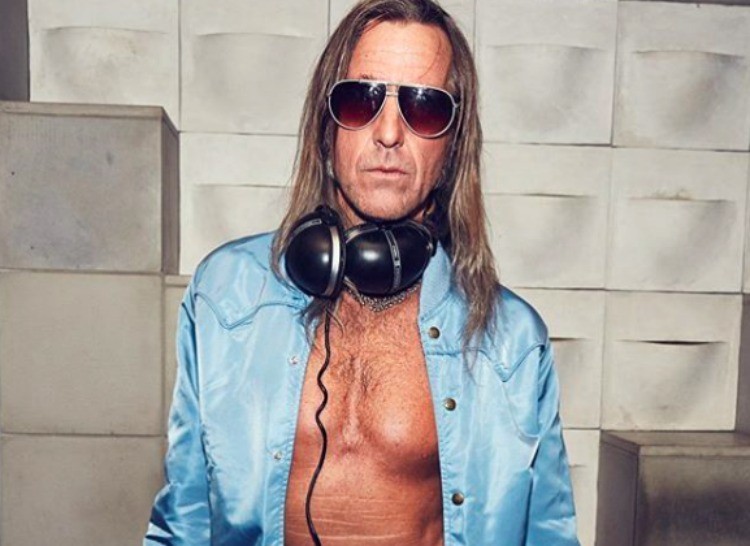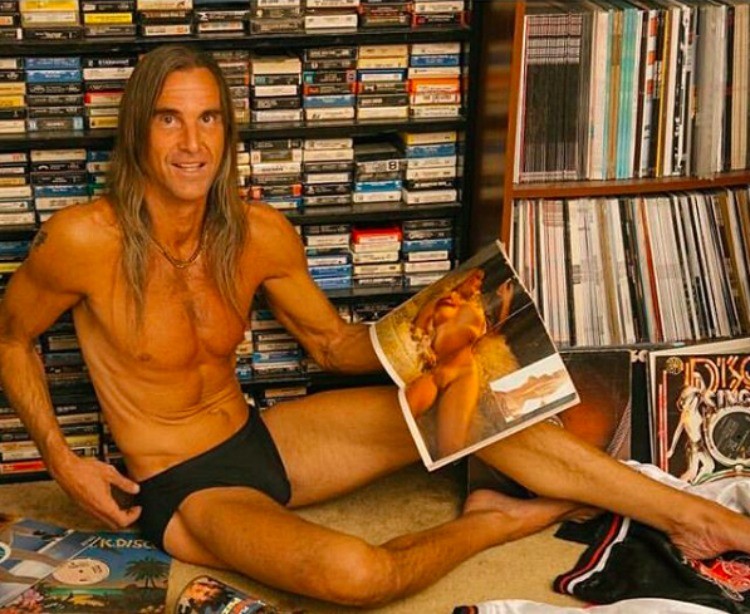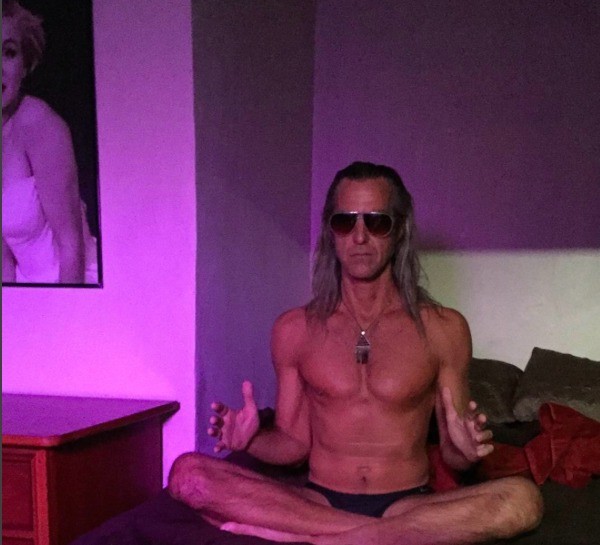 “Some of this is over my head right now,” I admit as I bump along in DJ Johnny Basil’s mid-nineties pickup truck. A decades-long fixture on the music scene, Basil seems to be going through a renaissance of sorts: popping up in music videos for hip young acts like Saint Mesa, Rainbow Arabia, Jessica Hernandez & the Deltas, booking regular DJ gigs including at The Wayfarer and the Ace Hotel downtown, touring with The Growlers and generally stoking millennial interest.
“Some of this is over my head right now,” I admit as I bump along in DJ Johnny Basil’s mid-nineties pickup truck. A decades-long fixture on the music scene, Basil seems to be going through a renaissance of sorts: popping up in music videos for hip young acts like Saint Mesa, Rainbow Arabia, Jessica Hernandez & the Deltas, booking regular DJ gigs including at The Wayfarer and the Ace Hotel downtown, touring with The Growlers and generally stoking millennial interest.
After leaving his house, we start off talking music and then quickly move to topics Mr. Basil is especially passionate about: his energy healing work, releasing from our angel/devil complexes and right/left mentalities.
These days, he tends not to get into some of this stuff unless someone asks him. Already, I feel like I should have brushed up on science, astrology, mythology and world-control theories to fully pick up what he’s throwing down as we twist through side streets on our way to 17th St. Recording Studio in Costa Mesa.
“I understand it’s all a game” he says. “Everything’s based on game theory and it has been for thousands of years…‘cause I understand the control mechs…what [they’re] going to control is the technology which would be your Tesla-orientated energy continuum vs. and Einsteinian- Newtonian-Copernican model of the universe, you know.”
 This is a lot to chew on. “Meet Johnny Basil: The Man You Wish You Were” is the title of a Vice/Thump article written by a British blogger not too long ago. The article painted him as some sort of hipster panty-dropper. Well, yeah. If you don’t talk to him about much I suppose.
This is a lot to chew on. “Meet Johnny Basil: The Man You Wish You Were” is the title of a Vice/Thump article written by a British blogger not too long ago. The article painted him as some sort of hipster panty-dropper. Well, yeah. If you don’t talk to him about much I suppose.
Honestly, looks-wise, he does have something going on. “I think my image is something that males and females can feel comfortable with,” he later muses over lunch.
This is the part where I say Basil looks like Iggy Pop. Because that’s what everyone says about him. And it’s true in the sense that they both have longish wispy hair and tend to go shirtless. Basil is tall and tan. He keeps fit by a combination of hard-core crunches, by performing self-developed yogic techniques as well as stretching and deep breathing. And pulling weeds that sometimes crop up in the backyard of the ranch-style home in Westminster he shares with his sweet 90-year old mother.
I find Johnny refreshingly earthy and unpretentious. He gives his mother a kiss as we leave the house and tells me that he’s focused on paying off her mortgage. His truck reminds me of that of my grungy college ex-boyfriend. Utilitarian when it comes to material goods (save his kick-ass record collection), it seems like he rotates a few key wardrobe pieces; sticking to a uniform of form-fitting jeans, and an interesting jacket. He understands the value of image-making while remaining comfortable in his skin. Often, quite literally.
At the studio, we temporarily set aside metaphysical musings. Basil is putting together a couple of mixes. There to greet us is Steve Chinn, who works with him at Ubiquity Records right across the street, Sam Holborn, who runs the indie label Forest Jams Records, and a couple of studio chihuahuas.
Johnny is a talented musician whose older recordings are layered, yet focused. In a previous profile on Basil for the Weekly, Dave Segal did a good job dissecting his earlier work and stints in bands like West Coast Harem. Now, ten years later, after a seven to eight year dry period, he’s working full stop paying more attention to the business side of things than he has before.
His biggest influence is Miles Davis. You can hear it in the jazzy streak running through his original music and even the way he speaks. He’s also a really good DJ. He plays what he’s into and knows what he plays: colliding the obscure against the iconic.
“My favorite style is Miami, for sure. Hands down, Miami-style, Miami bass is the best, for me,” he says, in front of his turntable. “And I actually see people responding to that really heavy, so I think at the end of the day, everyone probably really digs Miami even though they might not know that they’re being like, assaulted with it. It’s like heavy 808, really genius production…the attacks, the flows.” He demonstrates the bounce and push of the beat with the flow with his hands. “This is like a transition in the phase of B-Boy, coming from like breakdance and Run DMC style.”
Next, I’m introduced to Big Lady K and Queen Lisa; precursors to the more commercially known female MCs of the mid-nineties like Queen Latifah, MC Lyte, and Lil’ Kim. And then there is Gigolo Tony, smirking from the vinyl cover in all his ‘80s glory.
Soon, Sam presses something unusual into my hands. A cassette. Do I have a cassette player? No, and I can’t remember when I last did. But it’s beautiful to look at and touch. It’s a special edition release of “Basil & Rogers”, a disco dance/trance four track. Fullerton’s Burger Records handled the cassette release of the collaboration with Body Rogers (aka Brian McKinley of Black Bananas.) Basil collaborated with Rogers years earlier a synchronicity I could hear when I listened to the album online. The cover art, he says, a shiny lipstick tube underneath a late ‘70s font, depicts a “universal phallic symbol that defines backstage decadence-both male and female-a ‘seething’ decadence.”
Basil & Rogers is just one of a few things he’s working right now. BAAST, his project with R. Scott, is named after the Egyptian fertility goddess. Basil plays bass and Ubiquity released their latest album. It’s jazzy, funky and world-music influenced. Kandi Jones, which he fronts, is an opposing force of cynicism and street rock. The band is named not after a stripper, but the former model and purported CIA mind-control victim.
Over a lunch of shrimp, tacos and beer at Catalina Fish Kitchen, we talk a little about his reluctant embrace of social media, which evolves into a discussion of situationism and sloganeering. The idea that you don’t have to really be an artist or make art to be noticed, you simply have to make something happen and control it.
Basil rejects anyone trying to control anything. Especially information. “My whole game is, we have a table and all the information all the information goes up on the table” he says. “The worst of the left, the worst of the right, the middle and the super-ultra ideals, concepts…everything is a three-dimensional object you can turn it at every angle, compare and contrast; everyone gets to see it. That’s what I do. I don’t fantasize about the idyllic, it’s all about the tangible. Though the idyllic is where you shape things and bring them into the tangible world…make them happen.”
We head back to his house where the plan is to hang out for a little bit, then I’ll follow him to his gig at The Wayfarer.
 After a little vaping, Basil offers to let me demo his energy work. I hold out my hands and close my eyes. I’m thinking a lot about what I should feel and what to tell him if I don’t feel anything. I feel some heat. I feel Basil’s hands circling above my own. But I’m not feeling anything intense which makes me feel tense. I would definitely need to relax if I’m able to get to any sort of altered state.
After a little vaping, Basil offers to let me demo his energy work. I hold out my hands and close my eyes. I’m thinking a lot about what I should feel and what to tell him if I don’t feel anything. I feel some heat. I feel Basil’s hands circling above my own. But I’m not feeling anything intense which makes me feel tense. I would definitely need to relax if I’m able to get to any sort of altered state.
Earlier I had asked him: “The energy work…why is that the most important thing for you?” “Because it’s the culmination of all my studies,” he replied. “I literally can feel the field. And work the field and be a part of the field.” Sounds like a plan.


Great background to his appearance in The Library Music Film (Shawn Lee c.s. 2018).